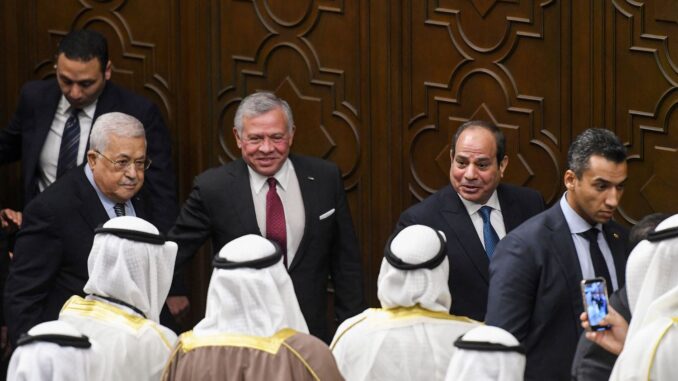
Last weekend’s security cooperation in the Middle East doesn’t indicate a new future for the region.
Do Arab leaders have Israel’s back? If one has scrolled through the social media commentary on the combined effort by Israeli, American, British, French, Jordanian, and possibly other Arab governments to thwart Iran’s missile and drone barrage on Israel, one might think so. A bevy of analysts, Israelis, and pro-Israel activists clearly want to believe it.
Alas, that claim is mostly hyperbole. Last weekend was many things, but the dawn of a “new Middle East,” marked by intensified Arab-Israeli cooperation at a renewed time of war, was not one of them. Fortunately, the truth is still reassuring enough.
Israel’s devastating military campaign in the Gaza Strip over the last six months has put significant pressure on its ties with Arab countries, especially Egypt and Jordan. Of the Arab states that have diplomatic relations with Israel, the Moroccan, Egyptian, and Emirati ambassadors remain in the country, though Abu Dhabi suspended its coordination of humanitarian aid with Israel after seven aid workers of the nonprofit World Central Kitchen were killed in an Israeli drone strike. Still, after all of the violence and diplomatic tension, it has become routine for journalists and analysts to ask whether the Abraham Accords, the diplomatic deal that normalized relations between Israel and several Gulf Arab states during the Trump administration, are now dead.
That’s one reason why the display last weekend of regional security coordination under the auspices of U.S. Central Command (CENTCOM) was so important. The other has to do with the United States itself. After more than a decade in which the American foreign-policy community sought to deemphasize, pivot away, and retrench from the Middle East, the Biden administration proved that Washington can be—separate from its confused approach to the war in Gaza—a source of security in the region.
But the conclusions should not be overstated. At the same time that Israel’s friends were high-fiving and the Israelis were publicly thanking the United States, the United Kingdom, France, Jordan, and regional powers for their help, Arab officials and analysts were working hard to temper all the talk about the new Middle East. Jordan’s King Abdullah II made clear that shooting down Iranian drones was a defense of their country’s airspace and that they would do the same if drones were launched in the other direction.
In a private conversation, one keen observer of the region and former Arab official relayed, “It comes down to how states perceive the legitimacy of military action. In the Red Sea, no one wanted to appear to be part of a maritime coalition that was seen to be defending Israel. Last night, countries shot down incoming projectiles because it can be portrayed as defending sovereign airspace and not wanting a regional war.”
Those are important arguments. Given the horrors of Gaza and the concomitant outrage of many Middle Easterners over the deaths of tens of thousands of innocents at the hands of the Israel Defense Forces (IDF), there is not a single Arab leader willing to publicly align with Israel—much less secure it. Still, defending airspace and preventing an intensification of the ongoing regional conflict yields the same result: helping Israel.
Setting aside the cheerleading of recent days, the coordinated military operations that protected Israel from mass casualties and destruction highlight the durability of the Jordan-Israel and Egypt-Israel peace treaties as well as the 2020 normalization agreements. No doubt, relations between the Israeli and Jordanian governments have been under strain in recent years as Israeli Prime Minister Benjamin Netanyahu focused attention on developing ties with the Gulf states and engaged in provocative policies in Jerusalem as well as the West Bank. This created political difficulties for Abdullah, threatening the delicate balance between the demands of Jordan’s majority Palestinian population, its active Islamist movement, and East Bank tribal leaders, alongside the strategic necessity of maintaining a profoundly unpopular relationship with Israel.
The king’s apparent determination to maintain ties to Israel—given their importance to Jordan-U.S. relations—included a security dialogue that remained important to Jordan’s leaders even as other aspects of the relationship with Israel weakened. This security cooperation intensified once Israel came under CENTCOM’s area of responsibility in September 2021. The Egyptians, for their part, do not seem to have played a discernible role in last weekend’s events, but they, too, have ensured that their security dialogue with Israel remains robust and mutually beneficial despite the many crises that have buffeted the bilateral relationship since 1979.
Critics will undoubtedly argue that these securitized relationships are nothing to cheer. The ties between Arab governments—whose legitimacy is compromised, in part because of their ties to the Israelis—and an Israeli state that has dispossessed and repressed Palestinians would not exist but for authoritarian leaders and the support they enjoy in Washington. But this does not negate the fact that the security dialogues that have been underway between these countries for years paid off on April 13.
The same basic argument holds for the Abraham Accords, under which security cooperation developed rapidly after years of informal and secret cooperation. There is no leader in the Gulf who trusts Netanyahu, and they recoil at what the IDF has wrought in Gaza, but the Emiratis, Bahrainis, and the Saudis (who are silent partners in the Abraham Accords) certainly dislike and fear Ayatollah Ali Khamenei and the Islamic Revolutionary Guard Corps more. This underlines what everyone already knows about the accords and why supporters of the Palestinians are so angry about it: The Arab leaders who have normalized ties with Israel place more value on fending off the Iranian challenge than Palestinian statehood. Despite the absence of some Arab ambassadors in Israel throughout these months of shocking violence, none of the Arab states that have come to terms with Israel have completely broken ties. The Saudi government, for instance, publicly maintains that it remains committed to normalization, though officials in Riyadh say they will require serious progress toward a Palestinian state. Yet even after all the violence and bloodshed of innocents in Gaza, the very fact that the Saudis still want to move forward with the Israelis says a lot about where the Palestinian issue stands among Arab leaders’ priorities.
Finally, after more than two decades during which the American investment in the transformation of the Middle East returned little or nothing, last weekend’s coordinated effort to prevent a wider and more destructive regional war (and, yes, defend Israel) was the result of Washington’s leadership. The episode demonstrates that when American policymakers focus on preventing threats to regional stability and security—as opposed to leveraging the power at their disposal to remake societies—Washington can be successful. Sure, critics will argue that the United States has been destructive in enabling the IDF’s destruction of Gaza. That is a potent critique. Would these observers prefer an all-out war in the region? Some may, given their views on Israel, but U.S. policy dictates otherwise.
Last weekend, there was a lot of commentary on social media and elsewhere expressing amazement at a new Middle East in which countries of the region coordinated an effort to thwart Iran’s attack on Israel. There is something to be said for that. But what’s more amazing when one takes a step back is that war has not actually changed the region that much. Regional governments still hate and fear Iran, harbor no particular commitment to Palestinian justice, want good relations with Israel, and desire American leadership.



